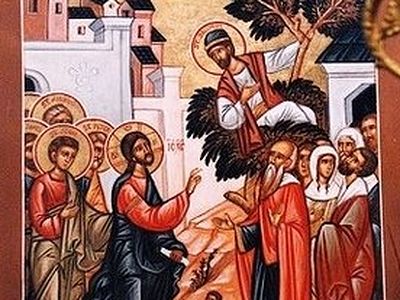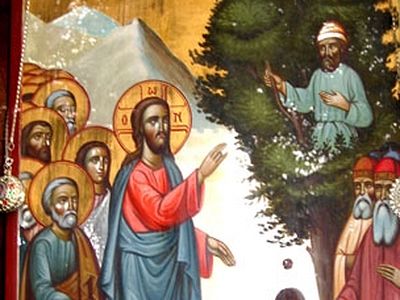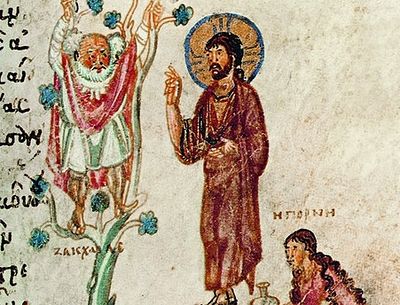Source: Orthodox Christian Network
Zacchaeus lives in the Church, abiding as an image of us all. In some sense, everyone of us is Zacchaeus, for everyone of us is a sinner at heart. That is why Zacchaeus is invoked and his example recalled every time the priest enters someone’s home to invoke the presence and blessing of Christ upon it (such as at the Theophany season, and when a new house is first blessed). Christ entered a good many people’s homes during His brief ministry, including the home of Simon Peter and of the ruler of the synagogue, and yet these visits are not invoked liturgically as was the visit to the home of Zacchaeus. That is because Zacchaeus stood out among people. Most people were decent folk, fallen, yet trying their best to do the right thing. They had a sound moral compass, and even when they strayed a bit, they tried not to stray too far or for too long a time. Zacchaeus was different. Zacchaeus was a sinner—that is, someone without apparent moral compass. He did not at all mind straying, and he had evidently lost his own moral compass a long time ago.
For that is what the word “sinner” (Greek amartolos) meant. It did not denote someone who was merely fallen and mortal, but the lowest of the low. The word described a person with a certain social status—or, more accurately, a certain lack of social status. Prostitutes were sinners, traitors and collaborators were sinners. Thieves and bandits were sinners. And tax-collectors of that time were sinners, and Zacchaeus, as a chief tax collector, was one of the worst. He was described in Luke 19:1f as “rich”, and doubtless he had grown rich in the same way as most tax-collectors did—namely by cheating decent folk and enriching himself at their expense. Poverty-stricken widows and their children went to bed hungry because of Zacchaeus and people like him.
Little wonder then that the locals were scandalized, shocked, and traumatized when Jesus stopped under the sycamore tree which Zacchaeus had climbed and announced publicly that He had decided to stay at his house. Christ’s visit would bestow status and honour upon the house which received Him, and everyone thought that no one deserved the honour less than Zacchaeus. What about the local head of the town, or perhaps the ruler of the synagogue? Why should they be passed over and snubbed—and for Zacchaeus, of all people? No wonder Luke reports (with his customary economy of words) that “everyone grumbled, saying, ‘He has gone in to be the guest of a man who is a sinner’” (Luke 19:7). But Christ saw more than simply a sinner. He saw a sinner who so wanted to reach out for something more that he was even willing to make himself look ridiculous by climbing into a tree (something no adult conscious of his dignity would ever do). Christ responded to that inarticulate reach. When Zacchaeus, sacrificing his dignity, reached down, Christ reached up, and the contact between them changed everything. Zacchaeus changed his whole life, so that salvation came to his house that day. Christ came into the world to save Zacchaeus. He came into the world to save sinners.
We note that in Orthodoxy today we do not use the word “sinner” in this way. We confess that we are all sinners. In our glossary, the word “sinner” no longer describes just the lowest of the low. We use it to describe everyone, including ourselves, and our prayers are as a result full of penitential words and phrases. We speak of “God’s righteous chastisement which impends against us”, and of His righteous wrath. God may not express His righteous wrath or chastise us, but our prayers confess that He would be just and fair if He did. We are “children of wrath” (Ephesians 2:3), properly deserving punishment, even if in His patience God does not punish. Why the change of terminology? Is the Church morbid when it takes a term describing the lowest of the low and makes it its universal self-designation?
No; the Church is not being morbid, just perceptive. When we look away from the outer circumstances, and the crowd and the concern over other’s status and look into our own hearts, we see the same brokenness and darkness that afflicts everyone. The Church is not being morbid; it just knows that given the right (or wrong) circumstances, anyone is capable of anything. It looks at the sinner, the prostitute, and the gang member and says quietly, “There but for the grace of God go I”. Deep inside we are all busted. The inner machinery which God constructed to produce a righteous life is no longer working. We plug it in, turn it on, and it does not produce a righteous life. Instead it produces laziness, lust, anger, resentment, greed and a host of other products we don’t like and didn’t ask for. In a word it produces sin, which is why the Church says that deep inside we are no better than the notorious sinners.
But let’s be honest. Most of the time, we don’t feel like we are sinners. We feel we are pretty good: “I’m okay; you’re okay”. In fact I recently heard one lady being interviewed on the radio who said (with no apparent sense of irony), “I can’t regret anything I’ve ever done, but everything I’ve done has helped make me into the person I am today.” Wow. So, no sense of sin here, and no confession that she is a sinner. But she is not so very different from most people in our culture, for our culture has effectively lost its sense of sin. Prior to the last generation or so, all people everywhere knew that they were in need of forgiveness from God or the gods or whatever transcendent tribunal governed the world. Now this sense of needing pardon has been lost, and our liturgical prayers talking about “God’s righteous chastisement” can sometimes seem to us a little strange. We cast about to redefine God and suggest that maybe He doesn’t have wrath after all.
What’s the answer? I suggest prayer. If you have the courage, try this: ask God to reveal to you the true state of your heart. Of course He will not do it fully, or you would burst into tears, take to bed, and sink into clinical depression. But He might do it as much as He thinks you can bear, and give at least a little glimpse into your true state. If we do see how sinful we actually are, that will produce two results. One: it will make it easier to forgive those who hurt us. After all, if we are such sinners, how much can we really hold it against others when they sin? Two: it will give us a sense of gratitude for His forgiveness and His love. Every Sunday at Liturgy we receive Holy Communion, and divine forgiveness through the Chalice. As sinners, we are completely unworthy of such love, and yet it is poured out lavishly upon us anyway. How can we not be grateful? Maybe that is why the Church holds the example of Zacchaeus before us as Great Lent approaches. Lent is about repentance and forgiveness, and it will be good to know how little we deserve the forgiveness we so constantly receive.




